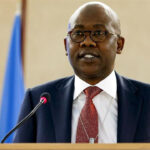There are indications that the CBN is considering renewal of its forex containment measures ahead of the 2023 elections to shield the local currency from further devaluation as apex bank is re-strategizing to align with its policy in 2015 around the same issue of dollarization of the economy across all strata of the society.
In plain terms, dollarisation of an economy occurs when the citizens of the country use foreign currency in parallel to or instead of the domestic currency as a store of value, unit of account, and/or medium of exchange within the domestic economy.
Recall that in a circular dated May, 21, 2015, issued by the director for banking supervision, on the same subject of currency substitution and dollars satin of Nigerian economy, the CBN reiterated that the pricing of goods and services in Nigeria shall continue to be in Naira only, and that it is a criminal offence to refuse Naira as a legal tender for payment in exchange of goods and services in Nigeria.
The CBN at that time, however provided a list of revenue-generating government agencies as well as businesses permitted to conduct business payments/receipts in foreign currency. According to the new circular, these agencies and operators include: the Federal Inland Revenue Service, the Nigerian Ports Authority, Nigeria Maritime Administration and Safety Agency, the Federal Airport Authority of Nigeria, the Nigeria Airspace Management Agency, the Nigeria Shippers Council, Operators in Oil and Gas – including Oil service companies, Operators in Maritime and Aviation Industries, Licensed operators in Export Processing and Free Trade Zones.
In addition, the CBN circular stated that holders of domiciliary accounts are allowed to make payments to and from their accounts according to existing regulations, but emphasized that CBN foreign exchange intervention funds and funds obtained from the interbank foreign exchange market are not permissible for deposit into domiciliary accounts.
Nigeria as a country has not officially adopted the dollar as a legal tender, but, unofficially, it is used as a means of exchange in the payment for goods and services. The term dollarisation does not only apply to usage of the United States dollar, but generally to the use of any foreign currency as the national currency.
On the efforts of the Central Bank of Nigeria, a member of the monetary policy committee of the CBN, Prof. Mike Obadan, said the CBN has ensured to carry out its mandate by using supply and demand management strategies, particularly, forex conservation and control measures as well as measures to ensure adequate supply of foreign exchange. This is particularly so because forex is a scarce resource that needs to be efficiently managed if the country is to achieve macroeconomic stability, and avoid chronic balance of payments and external reserve problems.
Obadan noted that for some time now, there have been issues about forex in the country, which predates the present administration, stating that over the years, genuine efforts of the federal government to achieve a headway on these have tended to be undermined by exogenous shocks in the past five years which pushed the economy into recession in 2016 and 2020.
According to Obadan, the first recession from the first quarter (Q1) of 2017, was triggered by the collapse of crude oil prices in the global market. The price of Nigeria’s Bonny Light crude oil then declined continuously from $62.22 in Q2 2015 to $34.39 per barrel in Q1 2016.
Owing to this, as at the second quarter, 2017, when the country exited recession, crude oil price per barrel stood at just $50.21 per barrel.
“Due to the heavy dependence of the Nigerian economy on the oil sector, the impact of the oil market crash was severe on export earnings, foreign exchange reserves, government revenue and other macroeconomic aggregates including economic growth
“External reserves declined from $28.28.33 billion in Q2, 2015 to $23.8 in Q3, 2016. The other external sector indicators similarly deteriorated: balance of goods and services, balance of current account, financial account, overall balance of payments, and external debt stock and debt servicing.
“The net forex inflow became negative, implying that the country paid out more forex to the rest of the world for importation of goods and services than it received. This implied that the demand for forex was higher than receipt of forex and the pressure on forex and the naira exchange rate was very high. This accounted for the devaluation/depreciation of the naira in relation to the US dollar at that time.
“Secondly, the Covid-19 pandemic-induced economic crisis in 2020 resulted in recession in the third and fourth quarters of last year. The pandemic containment measures in the form of economic lockdowns and restrictions on international travels and business resulted in recessions for countries in various degrees.”
Obadan who is also an Economists however, pointed out that the parallel market rate is determined mostly by speculators and rent seekers in a shallow and illegal market, which he argued constitutes a very tiny proportion of the forex market in Nigeria.
“Because the quantity of forex available in that market is very small in relation to the demand of the desperate economic agents that want to buy forex at any cost, the exchange rate is necessarily high. It cannot serve as reference for the naira exchange rate.
“If it is so, then it is the case of the tail wagging the dog! The parallel forex market needs to be avoided by decent economic agents. It will continue to exist as long as the naira is not convertible, the productivity of the economy remains low and the country does not earn enough forex from export of goods and services and capital inflows,” Obadan stressed.
Therefore, in order to stabilise the forex market and reduce the pressure on the naira exchange rate, Obadan said there was the strong need to move away from the country’s flawed pattern of economic management of the past.
He therefore called for a revival and rebuilding of the productive sectors of the economy to achieve higher capacity utilisation and productivity, and competitive manufactured exports; strong government encouragement of local refining of petroleum products for both domestic consumption and exports; as well as strong and effective surveillance of the forex market by the monetary authority to check round-tripping of forex from the deposit money banks to the parallel market.
On solutions, Obadan advised the government to ensure that during oil booms, it saves forex and build fiscal buffers; increases sourcing of local raw materials and revival of the capital goods industry; promote fiscal and monetary discipline and harmony; create an enabling environment for productive capital inflows, especially foreign direct investment; and actively promote restoration of confidence in the economy to check capital flight.
“A good handle on the current insecurity challenges along with macroeconomic stability will be very helpful in this regard; rationalise imports structure to manage demand for forex; as may be permitted by supply considerations, use external reserves stock to support the exchange rate through increased funding of the foreign exchange market; and use moral suasion to encourage Nigerians to patronise home-made goods and reduce their high propensity for disruptive trade and commerce,” he added.
CBN’s Intervention
As the mopping up of foreign currencies ahead of the 2023 elections continue, the Central Bank of Nigeria has had vowed to prosecute anyone found transacting business in the country with foreign currencies as medium of payment, as part of fulfilling its regulatory mandate.
Provisions of the CBN Act of 2007, states inter-alia that “the currency notes issued by the Bank shall be legal tender in Nigeria…for the payment of any amount.”
For instance, the CBN Act stipulates that any person(s) who contravenes this provision is guilty of an offence and shall be liable on conviction to a prescribed fine or six months imprisonment.
The CBN Governor, Mr Godwin Emefiele had noted that the currency for transacting business in the country remains the naira and had warned that it is illegal to carry out transactions using the US dollar.
He had said: “We will be looking at areas where people are making demands for foreign currency; people who are landlords who are asking for rent in dollars; schools that are asking for school fees in dollars or transacting business in dollars.”
He stressed that it was illegal in Nigeria to transact business in foreign currency and advised those involved in the practice to desist from doing so, because the CBN would soon come after them.




